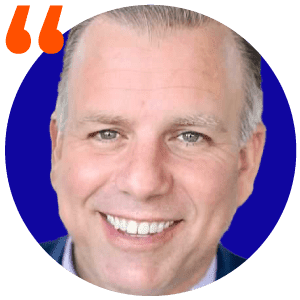When you think of the future of sales, it might conjure up images of watching product demos in virtual reality or having AI completely take over the sales discovery process. And while it’s fun to imagine these big, dramatic changes, in reality, the market transformation is likely to be much more incremental.
But even slow-moving changes still have a significant impact on your sales team. If you don’t keep your finger on the pulse of changing buyer expectations, technology, and skill sets, you might get left behind as competitors adapt faster and capitalize on new opportunities. Four revenue leaders shared their insights into where the changes are likely to occur and what form they’ll take.
Sales reps will own inbound lead generation
Gone are the days of sales and marketing working in siloes. SDRs and inbound sales reps will start to take over inbound lead generation campaigns from marketing departments.
It’s becoming more common for sales and marketing teams to be brought together into wider revenue departments, both reporting up to a Chief Revenue Officer. Terkel CEO Brett Farmiloe predicts:


If sales teams take greater responsibility for the whole sales cycle — from generating the leads right through to closing deals — then sales leaders will need to plan for new, specialist roles on their teams. According to Forrester, today, the average sales rep spends only 23% of their time on core selling activities. Increasing specialized sales roles enables other reps to dedicate more time to activities that move deals forward, rather than splitting their focus across outreach, lead generation, nurturing, closing deals — and anything else that lands on their plate.
Mindtickle Director of Sales, Jason Alumbaugh, says:


The rise of the sales influencer
Sales reps who have strong personal brands will be increasingly in demand with employers. As companies try to differentiate from competitors, reps with a strong social media presence will become more and more sought after. Their activities on social platforms build their reputation as an expert in their field, which helps them build trust more quickly with customers, extends their reach, and makes them a real asset to organizations.
Mindtickle GM and Regional Vice President Anthony Parker explained:


But placing greater importance on sellers’ personal brands can become a double-edged sword for businesses. It will make it easier for recruiters to identify and source top talent. Bringing on a social media savvy seller can bring attention to your organization once they join and update their networks. But reps with big personal brands may also be a risk, as they’re likely to be highly sought after by other companies and may be easily lured away by a more lucrative offer.
To prepare for this changing dynamic, sales leaders should encourage their whole team to build out their personal brand — and avoid hiring just one rockstar rep who makes a name for themselves on social media.
Sellers must be trusted advisors
According to Gartner, “33% of all buyers desire a seller-free sales experience.” As millennials take on more decision-maker roles in the sales process in the next few years, that percentage will only increase, as “44% of millennials prefer no sales rep interaction in a B2B purchase setting.” As a result, sellers will need to adapt their behaviors and processes to keep up with changing buyer expectations.
DataRails Account Executive Ed Haft believes that sales reps need to focus on becoming trusted partners and experts rather than the stereotypical pushy salesperson. He explains:


A 2020 study by LinkedIn found that 88% of consumers only buy when they see a salesperson as a “trusted advisor.” Therefore, if sellers are to remain relevant and continue to play their essential role in the future buying process, they need to prioritize building trust with their prospects. One way to do this is to focus on your customers’ desired outcomes and focus your sales conversations on solutions rather than sales.
AI will deliver crucial insights to help reps excel in any sales scenario
The majority of companies are investing in artificial intelligence and other technology to arm their teams with more customer data and insights to help drive more revenue. Forrester found that 68% of technology decision-makers have already implemented AI or are in the process of doing so. The proliferation of AI tools will mean sales teams can get more detailed insights across all their sales interactions.
Alumbaugh explains, “There will be a consolidation of sales tools so more effective AI-driven insights can be provided across all activities in the sales cycle.” While some reps may still have concerns about being replaced by AI, we believe that high-value sales transactions still need that human touch. So sales reps are perhaps some of the roles least likely to be replaced by AI and automation.
Using AI to analyze customer interactions will help sellers to better personalize their recommendations and follow-up messages based on prospects’ needs. Krittin Kalra, founder at Writecream, explained:


But all the AI-driven insights — and the tools themselves — will only help sales reps if they know how to use them and interpret the data. Although not a sales leader, Levi Olmstead, senior content marketing manager at Whatfix, believes that “it will be a challenge for sales leaders to support their sales reps properly. Reps will need the right process documentation and tools to be able to adopt these platforms and use them correctly.”
Competitive knowledge is a non-negotiable selling skill
In the U.S. alone, more than 400,000 new business applications were submitted each month in 2021, totaling over 5.3 million new businesses created over the year. So if you think you’re operating in a crowded market now, chances are it’s going to get even more so over the next few years.
Increasingly crowded markets mean that buyers have more suppliers to choose between. Haft from DataRails predicts, “The most important skill for sales reps will be their competitive knowledge and the ability to clearly and concisely differentiate your product and service against others in the market.”
Sales managers can help their reps build knowledge through ongoing sales enablement and training to prepare for this. Seemingly small improvements, such as achieving messaging consistency across the team, will help to present a more knowledgeable, prepared, and professional face to your prospects and help you stand out against less-prepared competitors.
The future of sales is full of opportunities — for companies that start preparing now
Incremental shifts are a big danger for sales organizations as they can be harder to detect and respond to than huge, sweeping changes. You don’t want to be the proverbial frog in the gradually boiling water, struggling as changes creep up on you and realizing you’re too late to adapt. But if sales leaders can help their teams embrace these changing market conditions and ensure reps develop the necessary tech skills and sales behaviors, they stand to capitalize on these opportunities while competitors get left behind.








